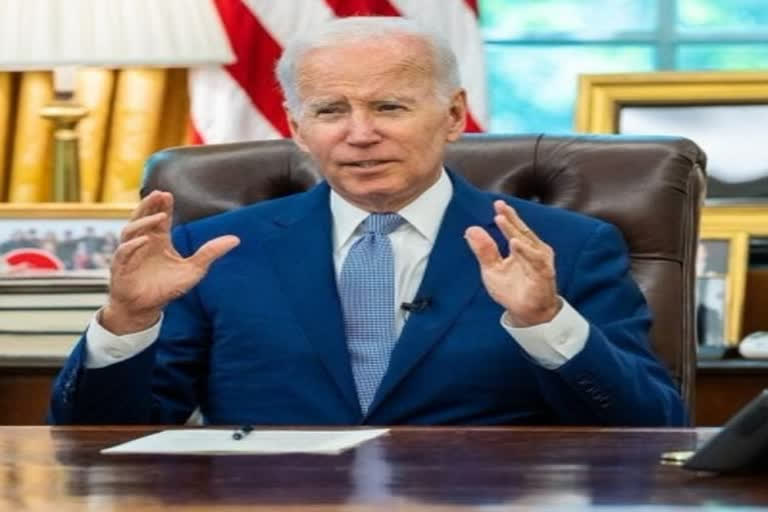Washington: The US is committed to ensuring a free, open, stable and secure Indo-Pacific, President Joe Biden has said, asserting that a great deal of the world's history will be written in the strategically vital region over the coming years. The president addressed the visiting leaders from a dozen Pacific Island countries in Washington on Thursday in the first-ever summit held to make the Indo-Pacific region safe and keep these island nations away from the increasing influence of China, which in the past few years has made extraordinary outreach efforts in the region.
Today, security in the Pacific and for the Pacific Islanders remains as critical as ever to us and I hope to you as well. The security of America, quite frankly, and the world depends on your security and the security of the Pacific Islands. And I really mean that, Biden said. He said the purpose behind the summit was also about deepening enduring commitment to each other and a shared future and commitment to tackling the climate crisis, which threatens all.
The summit was attended by heads of state from Fiji, Solomon Island, Micronesia, Papua New Guinea, Tuvalu, Marshall Island, Palau, Samoa, Tonga, Polynesia, New Caledonia and Cook Islands. We're seeing the consequences of climate change around the world very vividly, including in the United States right now. And I know your nations feel it acutely. For you all, it's an existential threat. It's an existential threat, Biden said.
We are also committed to working together to equitably rebuild the global economy in the wake of COVID-19 and Russia's war, to ensure an Indo-Pacific region that's free and open, one that is stable and prosperous, and resilient and secure, he said. A great deal of the history of our world is going to be written in the Indo-Pacific over the coming years and decades, he said, adding that the Pacific Islands are a critical voice in shaping that future.
That's why my administration has made it a priority to strengthen our partnership with your countries and with the Pacific Islands Forum, he said. Biden announced more than USD 810 million in expanded US programmes to improve the lives of Pacific Islanders, which includes more than USD 130 million in new investments to support climate resilience and build sustainable blue economies in the Pacific Islands; prepare for climate impacts on public health and food security, and to strengthen sustainable development; and also to build a better early warning capacity to predict, prepare for, and respond to climate hazards.
This is going to build on approximately USD 375 million in climate programmes we currently have in the region, he said. Biden announced that his administration will also take several important diplomatic steps. I'm proud to announce that, following appropriate consultations, we will recognise the Cook Islands and Niue as sovereign states, he said.
We look forward to successfully concluding negotiations for a Compact of Free Association with three of our closest partners in the region - the Federated States of Micronesia, the Republic of the Marshall Islands, and the Republic of Palau, he said. According to the White House, the Summit reflects America's broadening and deepening cooperation on key issues such as climate change, pandemic and economic recovery, maritime security, environmental protection, and advancing a free and open Indo-Pacific.
The Biden administration believes that the Pacific Islands region an ocean continent spanning nearly 15 per cent of the Earth's surface is a vital sub-region of the Indo-Pacific. It holds opportunities and challenges, from the climate crisis to an increasingly complex geopolitical landscape. The United States recognises that geography links the Pacific's future to our own: US prosperity and security depend on the Pacific region remaining free and open, it said.
The White House said it will coordinate with its allies and partners as well as with the Pacific Islands to avoid redundancy and best meet the needs of the Pacific Islands. It said it would deliver results through the Quad and the Partners in the Blue Pacific and in alignment with the Partnership for Global Infrastructure and Investment.
We will leverage multilateral partnerships with France, the Republic of Korea, the European Union, India, and other partners of the Pacific Islands to cooperate with the Pacific on climate resilience and adaptation; education and employment opportunities; access to financing; and protection of maritime domains and livelihoods, the White House said.
In November 2017, the US, Australia, India and Japan gave shape to the long-pending proposal of setting up the Quad to develop a new strategy to keep the critical sea routes in the Indo-Pacific free of any influence, amidst China's muscle flexing in the region. China claims nearly all of the disputed South China Sea, though Taiwan, the Philippines, Brunei, Malaysia and Vietnam all claim parts of it. Beijing has built artificial islands and military installations in the South China Sea. Beijing is also involved in a maritime dispute with Japan over the East China Sea. (PTI)



